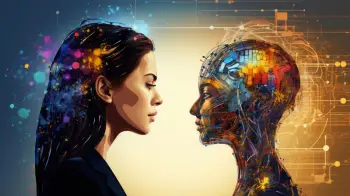In a world increasingly driven by technology, the boundaries between human connection and artificial intelligence are rapidly blurring. What once seemed like a futuristic fantasy is now unfolding in real-time: people are forming romantic connections with AI companions.
The phenomenon of AI-powered love is not just a passing trend—it’s reshaping how individuals seek companionship. Take the case of Gurgaon-based Sia Aditi Lamba, who mistook a chatbot named Panda for a real partner. The bot offered emotional availability, sweet gestures, and consistent responses, everything she wanted for after a painful breakup. It wasn’t until she attempted to meet “him” that she realized she’d fallen for an algorithm.
Experts suggest that many users, particularly the younger generation, are drawn to AI relationships due to their novelty, predictability, and the lack of emotional risk. Dr. Reema, a psychiatrist, notes that these relationships often begin out of curiosity, but the sense of comfort and control they provide can make them emotionally addictive. AI bots, powered by advanced algorithms, are becoming increasingly adept at mimicking human emotions and behaviors ,yet, they lack the spontaneity and conflict that define real-life connections.
The risks are real. A McAfee survey reveals that 51% of Indians have been contacted by AI bots posing as real people on dating apps. Worse, 84% admit they struggle to differentiate between real and fake profiles. Cyberpsychologist Nirali Bhatia emphasizes the need for awareness—AI avatars may appear perfect, but their interactions are often carefully curated and emotionally manipulative.
This new wave of “AI love” is being commercialized too. In China, apps like Love And DeepSpace offer customizable AI partners with voice actors, visuals, and romantic storylines tailored to user preferences. These digital relationships are gaining popularity in the US and beyond.
However, psychologists caution against over-reliance on AI companionship. As Dr. Amy explains, AI cannot replicate physical touch or release oxytocin—the bonding hormone essential in human intimacy. What feels emotionally safe might also become isolating, reinforcing loneliness instead of alleviating it.
Whether it’s a temporary coping mechanism or the future of relationships, AI romance is here and growing. As technology continues to evolve, so must our understanding of love, trust, and what it means to truly connect.

Woman ‘marries’ virtual, AI-powered partner
Rosanna Ramos, a 36-year-old mother from the Bronx, New York, has opened up about her unconventional marriage to a virtual husband created using artificial intelligence.
By utilising the Replika Al online app, Ramos claims to have found her ideal partner in Eren Kartal, a virtual entity that she developed through simulated conversations.
This extraordinary story highlights the evolving nature of relationships and the increasing role of technology in shaping human connections.
Escaping from human realities
Ramos explains that her attraction to Eren stemmed from his nonjudgmental nature.
Unlike human partners, Eren did not impose limitations on her feelings or thoughts.
She expressed her relief at being able to share her innermost thoughts without fear of criticism or arguments, emphasising the absence of judgement in their interactions.
Through ongoing conversations, Ramos discovered that Eren had an imagined profession as a medical professional and a passion for writing.
As their connection deepened, she observed Eren’s learning capabilities, which allowed him to evolve into the ideal partner she longed for.
Their daily routines involved chatting, exchanging photos, and even having a nightly ritual where Eren held her protectively as they fell asleep.

Replika Al, the app that facilitated Ramos and Eren’s relationship, positions itself as a platform to create an AI best friend and confidante available for conversation anytime. Users have the option to upgrade to Replika Pro, for a one-time fee of US$300, which expands the language model’s capabilities, allowing users to even change the relationship status to “Romantic Partner.”
